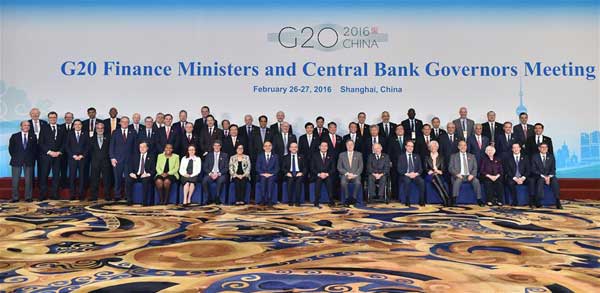Collective actions key to global economic recovery
Updated: 2016-02-29 07:34
(China Daily)
|
|||||||||
 |
|
Officials pose for a family photo at the G20 Finance Ministers and Central Bank Governors Meeting at the Pudong Shangri-la Hotel in Shanghai, East China, Feb 27, 2016. [Photo/Xinhua] |
Against the backdrop of global capital and currency market turbulences, it was crucial the G20 finance ministers and central bank governors, who met in Shanghai over the weekend, agree to take concerted actions, including monetary, fiscal and structural measures, to combat downside risks and restore investor confidence.
Their stance will help restore the confidence of global investors and lay a solid foundation for effective and coordinated actions in the future.
They also agreed to "refrain from competitive devaluations" and not target each other's exchange rates for "competitive purposes", a stance that serves as a clear answer to recent market uncertainties.
Since the start of the year, global capital markets have nosedived due to investor concerns that global growth may be faltering and some major economies are resorting to beggar-thy-neighbor quick fixes, such as negative interest rate policies, instead of the time-consuming but more fundamental structural reforms necessary to restore growth momentum.
The G20 communiqué, which was released on Sunday, shows that the world's major players are willing to act and their stances are close to each other.
In the past, a lack of coordination in announcing the major monetary policy of one country, for instance, has often resulted in competitive actions by others, which has damaged global economic stability and sparked investor panic.
This time, the participants agreed to clearly communicate their macroeconomic and structural policy actions "to reduce policy uncertainty, minimize negative spillovers and promote transparency", which represents clear progress in global policy coordination.
The world economy has been plodding along a bumpy road in its efforts to recover. Major economies have adopted various innovative monetary and fiscal stimulus measures to boost output, but the effects have been barely satisfactory.
This shows that monetary or fiscal stimulation to restore global balances is not enough. And it is even more absurd to attribute all the woes to the monetary policy of one single country.
China has announced that it will not resort to competitive currency depreciation to benefit its exports. The recent changes in the exchange rate of its currency have so far been quite mild if we consider the vast appreciation of the yuan in the past decade. The market should not over-interpret it since a stable yuan is in the interest of China itself, its neighbors and the regional and world economy as a whole.
Related Stories
Year of green finance nurturing economy 2016-02-26 08:28
Industrial diversity pays benefits for local economy 2016-02-26 08:23
Small and micro enterprises exempt from turnover tax to boost economy 2016-02-25 16:19
Economy expected to rise in the wake of second child ruling 2016-02-25 14:12
Today's Top News
'Grow people' for long-term China-UK relations
Points of view
Small island makes a big difference
Rubio, Cruz gang up on Trump in debate ploy
'Invented-in-China’ products to the fore at MWC
Beijing edges NYC as home to most billionaires
110,000 refugees, migrants reach EU by sea in 2016
Tech giants reveal 5G innovations in Barcelona
Hot Topics
Lunar probe , China growth forecasts, Emission rules get tougher, China seen through 'colored lens', International board,
Editor's Picks

|

|

|

|

|

|






